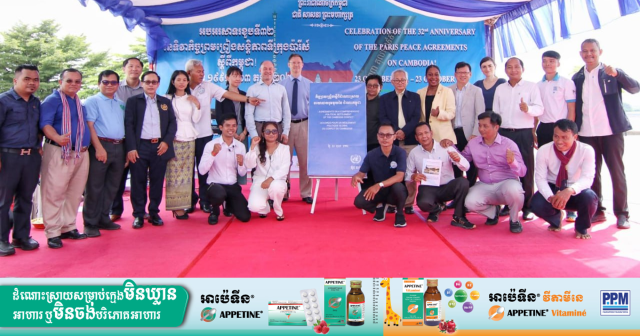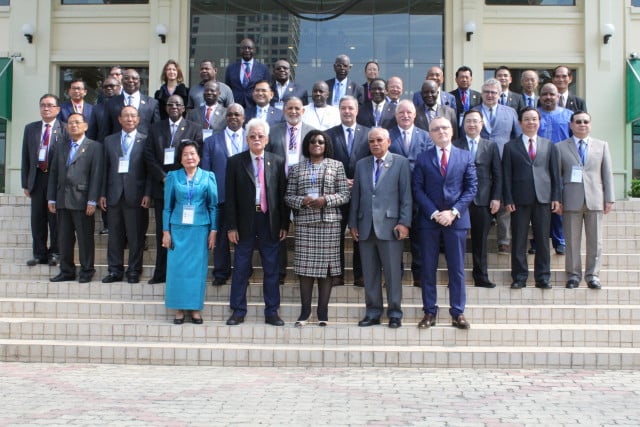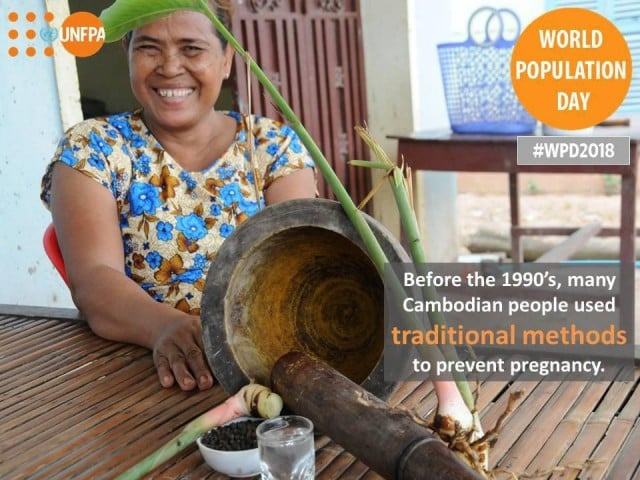Civil Groups Demand Respect for Human Rights as Paris Peace Agreements Turn 32

- By Teng Yalirozy
- October 23, 2023 9:00 PM
PHNOM PENH – Civil society groups urged the new head of the government, Prime Minister Hun Manet, to restore human rights and release political prisoners as they celebrated the 32nd anniversary of the Paris Peace Agreements that were signed on Oct. 23, 1991.
“I want to remind Cambodian people in and outside the country always to commemorate the 23rd October, a historical day that ended a civil conflict,” said Vorn Pao, the president of the Independent Democratic Association of the Informal Economy (IDEA) on Oct. 22. The celebration of the agreements took place at the new Freedom Park, located in Russey Keo district, far from its original place near Wat Phnom.
About 20 civil society organizations and associations joined the commemoration, which was also attended by American Envoy to Cambodia Patrick Murphy.
“We urge the young leader [Hun Manet] to re-list the date as a national holiday and to respect the agreement,” said Pao. “The government must respect the political, human and union rights by freeing political prisoners and the jailed union leader,” he added, referring to Chhim Sithar, the president of the Labor Rights Supported Union (LRSU) of Khmer Employees of NagaWorld, who has been jailed since Nov. 26, 2022.
In 2020, four public holidays were canceled, among which the Paris Peace Agreements Day, traditionally celebrated on the day of the signing. The other three public holidays that have been abolished were the Buddhist celebration Meak Bochea Day in February, Children’s Day in June, and the Human Rights Day in December.
Ul Vann, president of the Cambodian Youth Network (CYN), said that 32 years on, human rights have yet to be fully restored in Cambodia.
Citizens and youths remained ripped off of their rights and restricted from participating in certain social engagements, he said, referring to several members of the environment group Mother Nature who have not been allowed to go to Sweden to receive a pro-environment award.
Mother Nature Cambodia was awarded the Right Livelihood Award on Sept. 28 for its commitment to protecting nature and advocating for democracy.
But because some of its members are serving a suspended prison sentence after being found guilty of incitement for organizing protests against deforestation and water development projects, they had to ask for permission before leaving the country. The permission has been denied by Thon Ratha, the chief prosecutor of the Phnom Penh Municipal Court.
“I urge the government to stop preventing youth from exercising their rights and discouraging them,” Vann said. “We will work with [the government] if it is willing to work with us. We demand the release of the political prisoners and let the youth leave the country to get their reward.”
Meas Nysa, a Mother Nature activist, said preventing the members from receiving the reward means silencing their voices and intending to make their work look illegal.
“We want the government to respect the Constitution and the Paris Peace Agreement,” she said. “Please let youth freely join us and stop accusing us of conspiracy. What we do now is to show courage for the next generation of youth.”
Government Spokesperson Penn Bona said the Cambodian government has been acting beyond the Paris Peace Agreements, arguing that Hun Sen’s government had saved the country from the genocidal regime of Pol Pot even before the agreements were signed.
“This move led to the negotiation of peace until the Paris Peace Agreements came to light in 1991,” he said. “In 1993, the UNTAC [the UN mission in charge of restoring democracy in Cambodia] left, but our country did not yet have peace as there were still some armed conflicts between the remaining Khmer Rouge soldiers.”
Bona said that peace was fully granted to Cambodia in December 1998 with the establishment of the Win-Win policy of ex-premier Hun Sen. “So, it’s more than the Paris Peace Agreement. We created peace, united the nation, and organized the election,” he said.
He stressed that Cambodia only punishes those who act against the law, adding that the government has no power over the judicial system.
Hun Sen’s Cambodian People’s Party (CPP) gained abundant support in the 2023 general election, claiming 120 seats at the National Assembly.
Despite the royalist party FUNCIPEC gaining the remaining five seats, western countries considered the elections as neither free nor fair after the ban of the Candlelight Party, Cambodia’s biggest opposition party. UN experts also raised their concerns over the credibility of the poll.
“I reiterate that the government continues to serve the citizens and bring peace and prosperity to the nation,” said Bona.
The Paris Peace Agreements were signed in France’s capital on Oct. 23, 1991, with the representative of the Cambodian government Hun Sen and Cambodian factions including the FUNCIPEC of then-Prince Norodom Sihanouk; the Khmer People’s National Liberation Front of Son Sann, a leading political figure of the 1960s; and the Khmer Rouge factions that had fought the Cambodian government’s forces for a decade.
The Paris Peace Agreements led to the establishment of a new Constitution and general elections in 1993, marking the start of the reconstruction of Cambodia.















